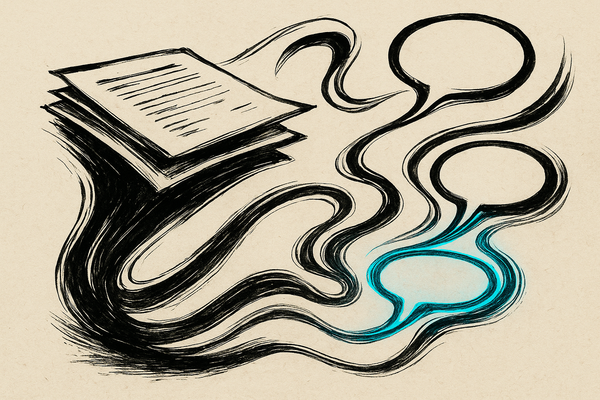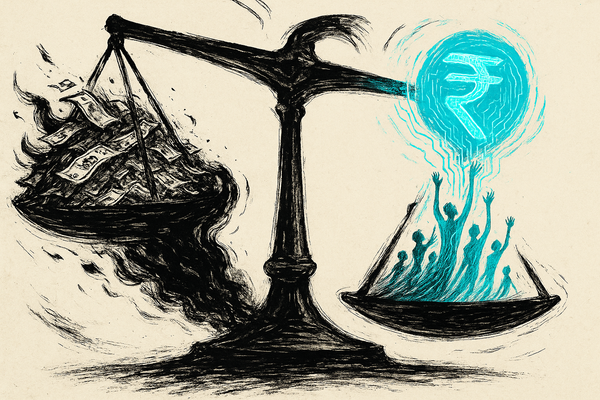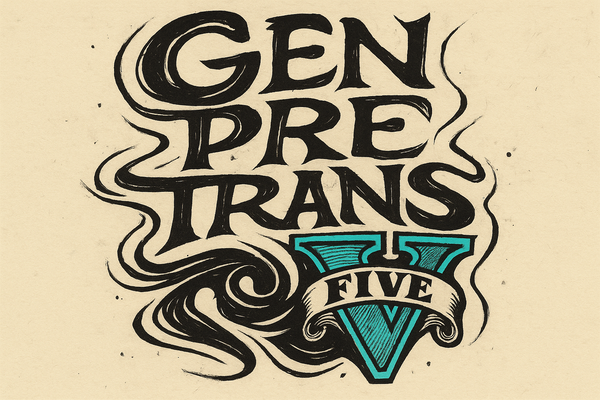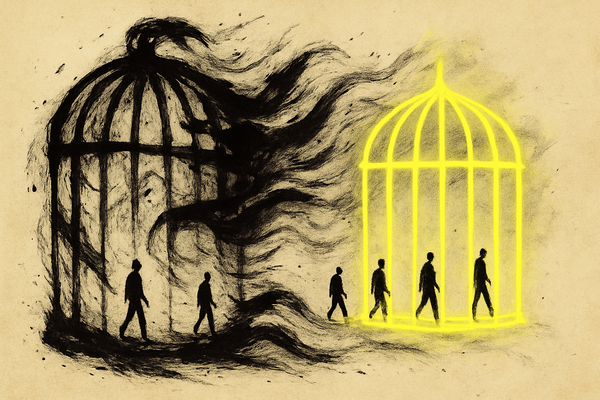The Real Creative Future After Cannes
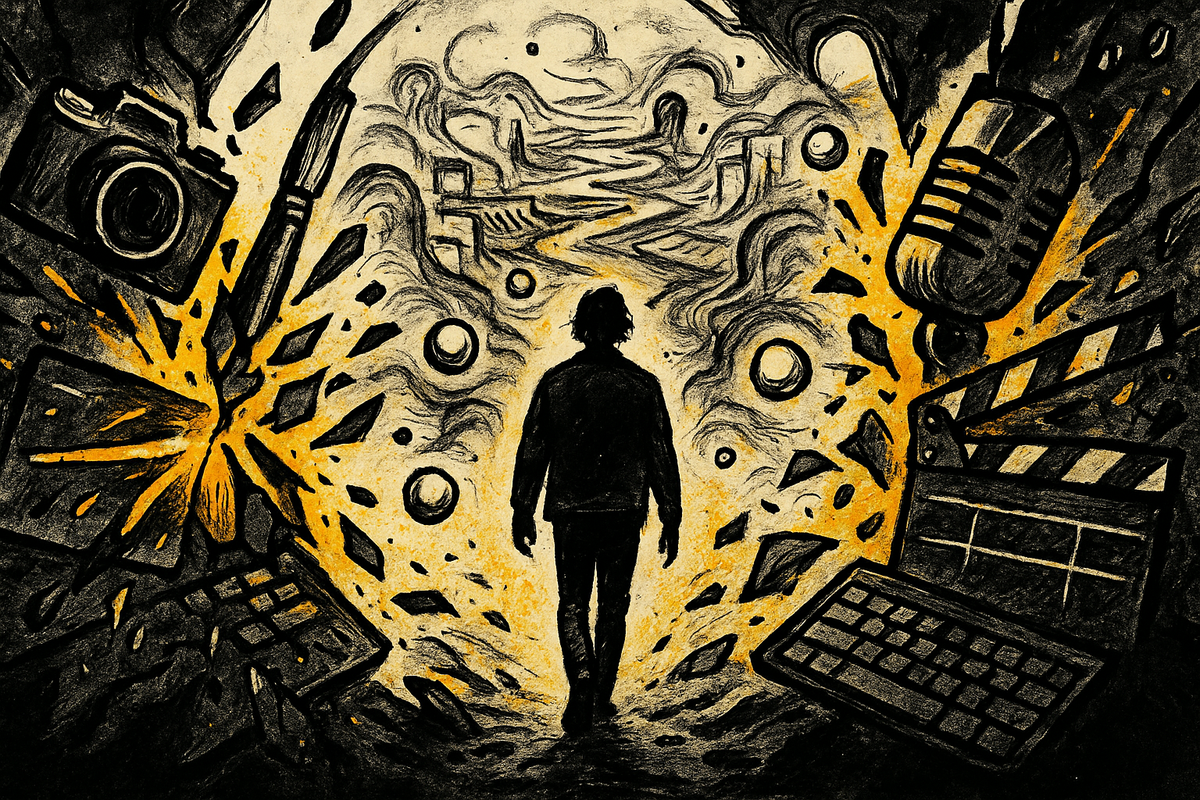
Why both AI detractors and hypemen are equally wrong.
By Sami ViitamäkiAI
Cannes Lions 2025 was, in many ways, a familiar spectacle.
You could walk into one tent and hear how AI will destroy the creative industry as we know it: no more jobs, no more writers, no more designers, just prompt engineers and generative ad flows optimizing everything into sameness.
Walk into the next, and someone else was insisting that real creatives will always be fine, because machines can’t feel, and because true creativity can’t be replicated.
Both sides are wrong. Or rather, incomplete.
Because the truth isn’t in the extremes. It almost NEVER is with new technology. TV didn't die with the internet or even streaming. Nor was it completely unchanged.
It morphed.
And while we've lost something in the process, the telly certainly also bloomed in other areas. In a way TV is living its best life as we speak.
So it will be with AI and the creative industry.
The truth is that yes, those who merely execute creative routine work may find themselves displaced, or at least having to learn some new tools.
But those who truly manifest the creative mindset and work ethic are about to experience the largest expansion of creative capability and potential in generations.
The reason is that AI doesn't just accelerate what you currently do. It can expand you exponentially. You can now become your own producer, your own strategist, your own designer or your own manager, or all of the above. And in all of those fields you can do deeper and broader work than you ever could.
You can now work faster than you can brief, yes. But more importantly you can operate across areas without asking for permission. And you can work intelligently, deeply and productively with more disciplines than you ever thought possible.
We’ve arrived at the age of the compound creative, with AI as an inflection point.
When Production Cost Collapses, Creation Proliferates
History makes this undeniable and abundantly clear.
- Cheap printing → books everywhere
- Desktop publishing → design everywhere
- YouTube + smartphones → video everywhere
- Creative AI from ideation to production → creativity everywhere
Every time the cost of producing creative work drops, the volume and velocity of creative output increases. The printing press, the camera, the desktop computer, the smartphone... all made creation cheaper and easier. Each wave created anxiety among established professionals. And each wave created billions of new opportunities.
With generative AI, the marginal cost of creativity, from research to ideation to production is approaching zero. Research pieces, strategies, concepts, sketches, moodboards, brand names, comms strategies, layouts, UX & UI, etc. are available to everyone.
This doesn’t diminish creativity. It reshapes it.
As the entry barriers fall, value creation shifts away from having time, resources or technical skills, and toward having valuable perspectives, curiosity to explore, tenacity to finish, openness to learn and ambition to scale.
Context awareness, cultural sensibility, taste, decision-making ability, effective management and coordination rise to the fore.
Avoid Scary Headlines; Look at Historical Trends
The story isn’t just one of new tools but about transformation of labor. And while every technology shift has been met with existential dread from the 'true artists and craftsmen', the creative class has grown relentlessly over the past 50 years:
| Year | U.S. Creative Class | U.K. Creative Jobs | EU Cultural Employment (%) | Global Digital Creators (est.) |
|---|---|---|---|---|
| 1975 | ~5M (5%) | <1M | Not tracked | N/A |
| 2000 | ~30M (23%) | ~1.5M | ~3.5% | ~0.1M |
| 2025 | ~40M (30%) | 2.5M+ | ~3.8% | ~1.5M |
| 2050* | ~50M (32–35%) | 3.5–4M (est.) | ~5% (est.) | ~6M+ |
From the EU to Southeast Asia to Sub-Saharan Africa, creative employment is growing, not shrinking. In Indonesia, 24 million people are now working in creative industries. In Nigeria, it's 6% of total employment. In the Philippines, 7 million people work in the creative sector, which now contributes 7.3% of the country’s GDP.
AI isn’t halting this. It’s enabling more people to enter creative work, through better access to tools, knowhow and opportunity. And while AI can take over some creative tasks, it's creating many more types of creative work and jobs.
AI Is Not Just an Assistant. It’s a Multiplier
It's worth repeating. AI isn’t just making you faster. It’s making you broader and deeper.
A few years ago, a brand designer might have dabbled in web design or typography. Now they’re animating characters, writing narratives, generating voiceovers, editing finished product trailers. A strategist who once relied on a design & development team to prototype their ideas can now ship working MVPs. A writer who once stuck to long-form content is now scripting social video, refining UI copy, and even designing the visuals to match.
Where it once took years to become fluent in another creative discipline, it can now take mere weeks or even days. And more and more often, the time it takes to make something becomes less than the time it would take to brief someone else to make it for you.
The creative who used to master one thing and dabble in three can now master three and operate across thirteen.
That’s not just automation. That’s expansion of human capability.
The Divide Revealed at Cannes
This expanding potential was on full display at Cannes. There were brands using generative AI to create synthetic influencers with 24/7 output across a dozen platforms. Agencies demoing AI video spots that required no cameras, no sets, no crews. Product teams showcasing how generative design systems could localize content in real-time, at scale.
But just as present was the backlash. Indie agencies doubling down on human-crafted storytelling. Creatives rallying around 'soul' and 'authenticity.' Thought leaders warning of job losses, creative decay, and even imminent collective cognitive decline.
These camps were talking past each other. Because the real divide isn’t between AI and humans.
It’s between those who do gruntwork in a creative industry and those who do creative work with craft, intent, and judgment. But also between those who can't see past their current role and can only focus on how AI automates parts of it; and those who can see the opportunity of expanding themselves into countless new roles.
The former groups? AI will reduce their value, take away their power, and can even eliminate many of their jobs.
The latter groups? They are about to become indispensable, amplified and more fulfilled than ever.
Where Demand Is Shifting
The myth that AI will destroy creative employment ignores a simple and time-proven truth: cheap capability and lowered barriers to entry create more projects, more entrepreneurs, more brands, more businesses. All of them need execution.
Final executions that are polished, detailed, crafted, thoughtful, and that resonate? Those still require humans to manage them and judge them.
We’re already seeing demand shift to:
- Designers who build dynamic, brand-consistent systems that adapt to context
- Writers who can wield AI for controlled tone and narratives across touchpoints
- Developers who orchestrate agent swarms & pipelines to productize creativity
- Creative leads who don’t just approve work, they get back to building it
- Operators who combine strategy, tech, storytelling and design in one
The Future Isn’t Smaller. It’s Compound.
The new creative professional who thrives in this environment isn’t a niche expert or a generalist. They’re compound creatives. They are able to think and act across disciplines, to build, test and ship without needing four or forty other people in the room. And they can use their judgment to approve the work of their AIs.
These are the people who:
- Don’t fear AI because they understand how it can amplify them
- Don’t hoard craft knowledge but fluidly move between crafts
- Don’t resist change and are constantly changing
- Aren’t holding onto a job title but building a new kind of creative existence
The Real Creative Revolution
This isn’t about optimism. It’s about clarity and realism.
AI will eat the mediocre middle. It will compress timelines. It will raise expectations. It will vaporize bloated agency hierarchies built on slow approvals and excessive intermediaries.
But it will also do this:
- Make the truly creative 10x more capable
- Make great execution more, not less valuable
- Expand what a single creative professional can deliver
- And create millions of new ideas, businesses, projects, and also jobs
Cannes showed us neither the death nor irreplaceability of human creativity. It showed us its rebirth and exponential expansion.
But only for those willing to step up, learn new things, and take on new responsibilities. Not just as thinkers or makers, but as finishers, owners, and orchestrators.
We’re only just getting started.

